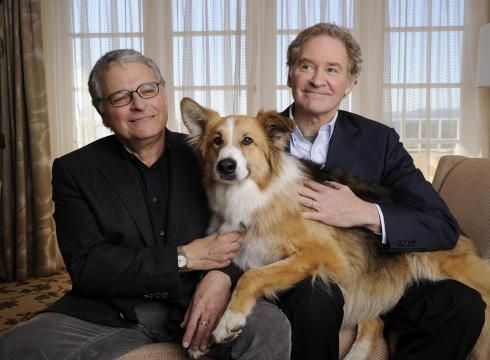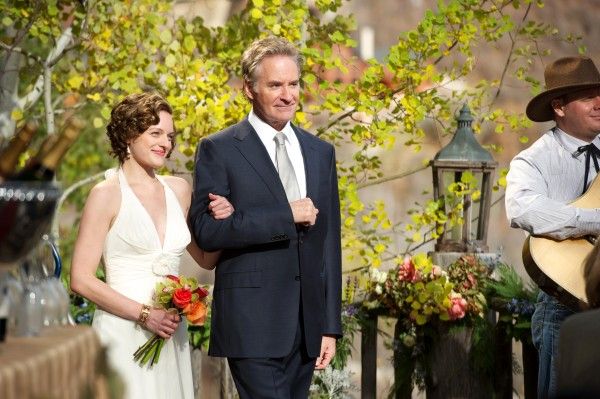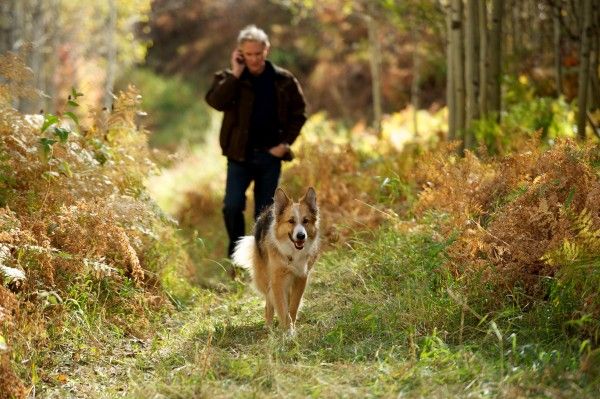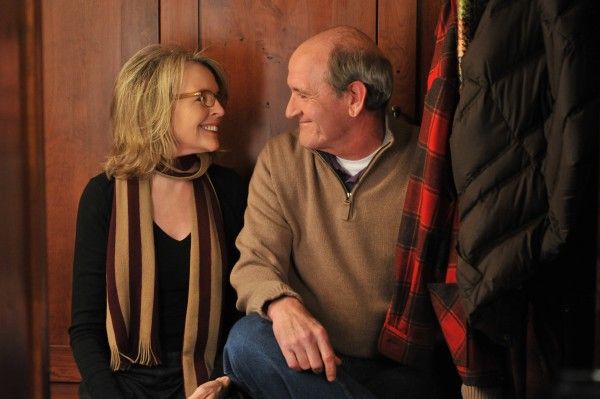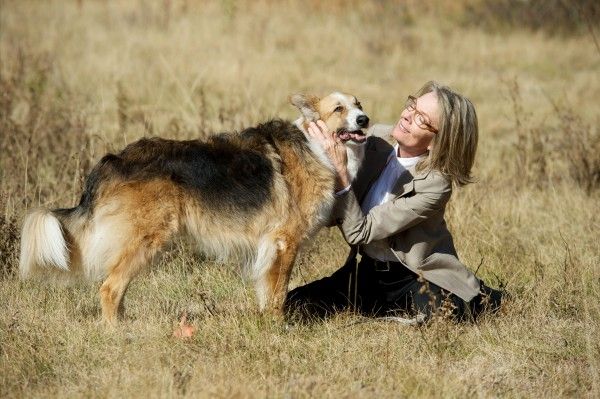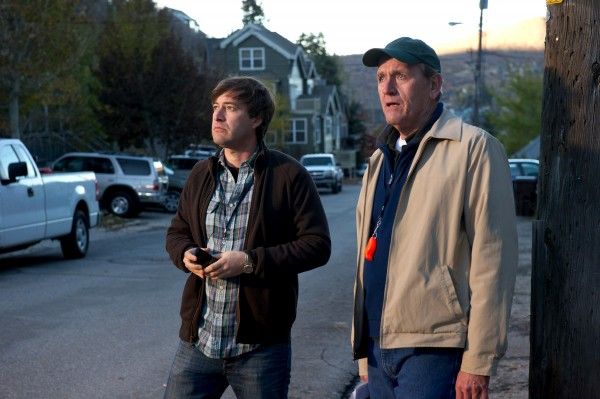In the drama Darling Companion, from director/co-writer/producer Lawrence Kasdan (Body Heat, The Big Chill, Silverado), Beth (Diane Keaton) and her daughter (Elisabeth Moss) take home a dog that they find on the side of the freeway, much to the ire of her husband, Joseph (Kevin Kline). Before long, the dog, aptly named Freeway, becomes a beloved member of the family. But, when the dog bounds away into the woods after a deer, everything is thrown into crisis mode and a search party forms that ultimately ends up bringing the entire family closer together.
At the film’s press day, actor Kevin Kline talked about what keeps him coming back to work with filmmaker Lawrence Kasdan (they’ve done six films together now), working for scale to get the movie made, why a film like this is a tough sell to a Hollywood studio, how much improvisation went on, why people seem to love their dogs more than each other, and what it was like to work with Diane Keaton. He also talked about how he likes to have fun when he’s working, that he’ll be doing some Shakespeare this summer, and that he’s hoping to do the Charlie Kaufman film Frank or Francis next, in which he will play three characters. Check out what he had to say after the jump:
Question: This is your sixth film with Lawrence Kasdan. Was it any different, this time around, since it was his first independent film?
KEVIN KLINE: No. He’s still the same writer and same director. Essentially, everything was the same. It’s just the pace that was just different. It was faster.
You were rushed?
KLINE: Well, the whole trick to doing an independent film, is to keep great pace and momentum. You’re shooting maybe three times as many scenes in one day that you would on a big, luxurious budget on a luxurious schedule, and you try not to sacrifice quality for that. It just means that you can’t go, “Oh I’ll learn my lines, as we do 40 or 50 takes. It’ll come.” No, you’ve got to show up and be ready to go. Things are just compressed, but essentially the same.
You all worked for scale to work with Lawrence on this. Is there any reason that you wouldn’t work for him again?
KLINE: I wouldn’t work for him for less than scale. If it comes to the point where we have to pay him to work for him, I’ll draw the line. No, that’s not true. I’ve done a couple of movies for scale, and it’s the only way to get a lot of these independent movies made. The actors negotiate deals where they’re given just enough money to live on during the filming, but then they participate in the back-end. If the movie suddenly makes a gazillion dollars, we’ll participate in that profit.
Were Hollywood studios just not interested in a picture that didn’t have superheroes or gimmicks? Did he try studios first?
KLINE: I don’t even think he tried, with this one. I don’t know the whole history. He took The Big Chill to six different studios before he found one that said, “Yes.” It was hard enough, back then, because there are no car chases and explosions. He writes about real people, real situations and recognizable people, and studios are becoming less and less interested in that sort of story.
What do you think it is about human beings that we can be so intolerant of one another, but we can love our dog so much? What’s the psychology behind that?
KLINE: Well, you know, I’ve written several books on the subject. No. I don’t know, but I think that’s at the core of the movie. What is that? Is it because they’re innocent? We’re part of their kingdom. We’re all animals, but we’re a different sort of animal. Maybe they’re better than us. They’re more loyal. They’re more pure. They’re more simple. They’re not neurotic. Well, there are some neurotic dogs. I know dogs who are on anti-depressants. That’s in New York, but I’m sure there are some on anti-depressants in Los Angeles, too. Dogs do have feelings. I gather. We know so little. There’s always some new study where someone goes, “Oh, we found out that monkeys remember kindness, or feel revenge, or have certain emotions that we never thought they would.” And, the same with dogs, or with any animal. It’s a mystery. But, I do think, on a very simplistic level, that we can project onto dogs because they are so innocent. They don’t come with a lot of baggage.
You seem to speak from experience. Do you have dogs at home?
KLINE: I grew up with dogs, and we have a dog in my family.
What is it about Lawrence Kasdan that draws you back to work with him, again and again?
KLINE: First of all, I like the way he writes. I’m interested in the things he’s interested in, in terms of human nature, relationships, how people are, how they perceive themselves, how they misperceive themselves, how others perceive them, and just the day-to-day struggles of ordinary people in ordinary situations, as opposed to extraordinary, heroic people in extraordinary situations. So, I’m interested in his writing and I love the way he directs. He’s very collaborative. He trusts actors. Nothing makes an actor feel freer and more inventive and more creative than being trusted. A director can look at you like, “Oh, god, I hope he does this scene right because I really see it a certain way and it’s got to be just right.” And then, there’s my kind of director, like Larry, who says, “Let’s see what you’re all going to do with this material.” If it’s terrible he’ll bring you back in line. That’s why I keep going back for more.
How much improvisation goes on?
KLINE: Well, Larry will say that every time an actor opens his mouth, it’s an improvisation, even if he’s saying exactly the lines that are written. He considers improvisation as the animation and the bringing-to-life that the actor adds. It’s his sensibility, his mentality, his taste, his technique and it’s who he is that will bring his work to life, otherwise it’s just words on a page. There’s very little ad-libbing. Just a word here and there, or a phrase thrown in. That’s how it’s always been with his films.
Is that because the scripts are so good?
KLINE: Yeah. Why change it? Usually, improvisation is when there’s something missing in the scene. You can’t pin it down, but things are happening in the writing and the playing, if you just do it simply and honestly. It doesn’t need a lot of, “We’ve got to add some more jokes here,” or “Maybe I should fall off the chair here.” You don’t have to dress it up very much.
How was it to work with Diane Keaton?
KLINE: She was the one exception. She gives nothing. She’s mean-spirited. She’s arrogant. I have no hopes for her career. No, she’s a very special person. She’s unique. She’s gifted, and tremendous fun to work with. We had a ball. I’m peaking for myself. If she loathed working with me, she never showed it. We laughed a lot.
Are there any roles that you regret turning down?
KLINE: No. Some of them have been highly successful, big money-makers, and artistically they turned out brilliantly. I just didn’t want to do it, at the time.
Is it because you put family and quality of work first?
KLINE: Yes. Well, there are a number of factors that go into it – pure whim, laziness, having just done something similar to that, not wanting to repeat yourself, or you meet the director and he just doesn’t seem like a person you want to see, first thing in the morning for three months of your life, or all day. It’s a very intense experience, so you want to surround yourself with actors, directors, crew members, caterers, dogs, drivers, and whatever, that are nice people to be around. It’s mostly laziness, though.
Is it even more important to have an enjoyable experience on a smaller film like this, when you’re moving so quickly?
KLINE: No. I’ve had highly enjoyable experiences on big studio films. I tend to have fun when I’m working. I’ve been fortunate to work with fun people, for whom it is not drudgery and who are not manipulators, but who are actually collaborators. I actually like moving along. There’s not a lot of sitting around, waiting for the lighting. The guy who did this film did great lighting because he doesn’t take forever. You can do 50 takes and it’s usually the first one or two that you’re going to end up with. Maybe you’ll get a combination of the first two or three takes, or the 49th and 50th. The rest, in between, are just agony. So, doing just three or four takes is fine.
Do you know that you have a reputation among actors for being a very giving and supporting partner in a scene?
KLINE: Well, thanks. I’ve heard stories like, “Oh, he’s terrible. He doesn’t give you anything,” or “He’s just trouble and not fun to work with.” I’ve been spared that experience. The best actors to me are the ones who are giving you the most, and who are generous emotionally, spiritually and professionally because they are present and there. Those are the best actors that I’ve worked with.
Is the Charlie Kaufman film, Frank or Francis, your next project?
KLINE: It could well be. It depends. It’s a huge cast, and getting everyone in the same place, at the same time, and the certain amount of money in place to make the film, is tough. I’m just waiting for a start date. The producer is actually the same producer for this film, and he’s very confident that it’s all going to come together shortly.
So, what will you do while you’re waiting?
KLINE: I’m just going to go about my business of doing whatever. I’m doing some Shakespeare this summer, briefly, and maybe another movie or something. It depends. I could get a call this afternoon saying we’re going to start in two weeks, on Frank or Francis.
Could you talk about your role in that movie? There’s music in it, so will you be singing?
KLINE: One of my characters sings. I play three characters. That sounds interesting, so I don’t want to disappoint you by giving you anymore details.
What was it like to do your Oscar video with Mike Myers?
KLINE: Well, interestingly, we had talked about doing it with six other actors. Originally, the sketch was going to have all sorts of big movie stars. It was at the Oscars and they were being pulled off stage, and being given lessons by that guy. They couldn’t get everyone there, so I thought, “I guess it’s not gonna happen.” Then, I get this call saying, “Mike is in make-up. Are you doing anything this afternoon? He thinks just the two of you could do a version of it, and you could just make it up as you go along.” So, I said, “Yeah, that would be fun.” I had never worked with Mike Meyers, so I went down and we just made it up. It was fun.
Obviously, you’re not thinking Oscar with every role that you play. How do you choose projects that you want to do?
KLINE: First of all, the thing I won an Oscar for was something I had never dreamed had anything to do with Oscar potential. There are jokes about, when you read a script, you think, “This has Oscar written all over it! I get to die. I get to save lives. I get to have that rare wasting disease.” There are certain trappings that are clichéd notions about Oscar roles. I think I’m past that now. There’s no predicting what will get an Oscar, and no predicting what won’t. I think they have their place in the business, but it’s not something I think about. I just try to do things that interest me and that might be a movie that I might actually go see. Not because I’m in it, but because the material is interesting.
Do you have a favorite Lawrence Kasdan movie?
KLINE: That’s a tricky question. They’re all different. They’re all fun. I Love You to Death was pretty crazy fun. Just working with Tracey Ullman and everyone in it was great, and the material was great, and playing that guy was fun. If I had to pick one, I might say that. But, it’s not by a length. It’s by a nose. So, I keep coming back.


